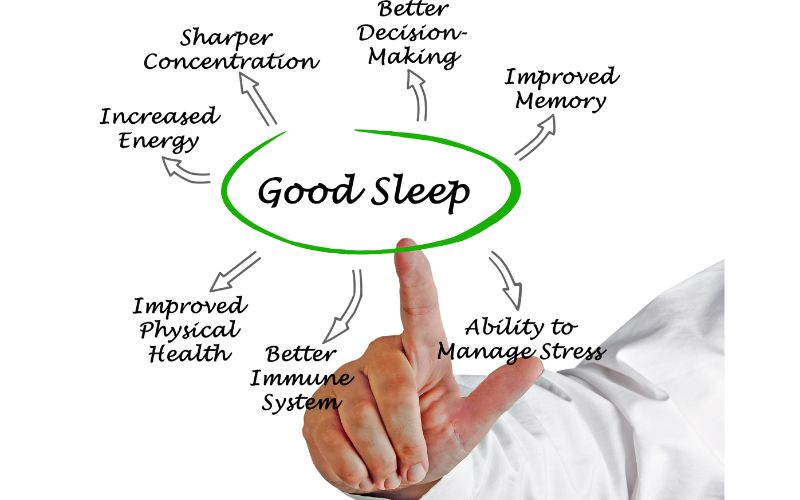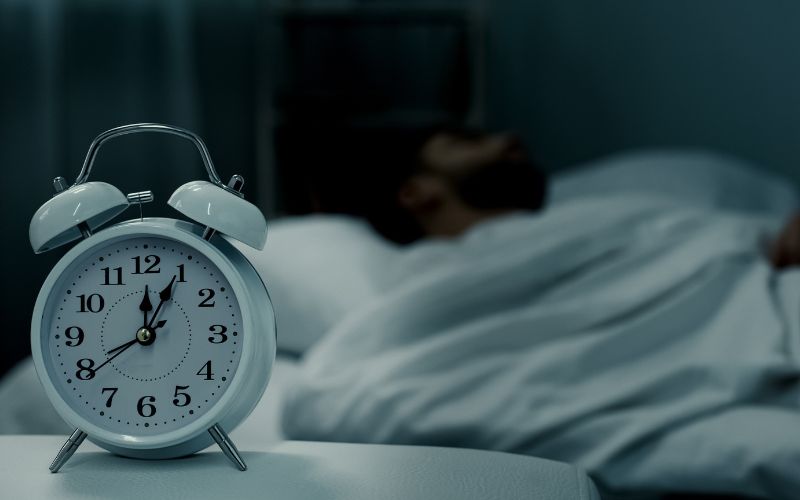Sleep is a crucial, yet often overlooked, aspect of weight loss, particularly during menopause. As your body undergoes hormonal changes, maintaining a healthy sleep schedule becomes increasingly difficult but essential to overall well-being and weight management. In this article, we will explore the connection between sleep and weight loss during menopause and provide actionable tips to improve your sleep quality.
By focusing on sleep, alongside The Menopause Diet 5 Day Plan to Lose Weight, you can ensure that your efforts to lose weight are well-supported by your body’s natural recovery processes.
Table of Contents
The Relationship Between Sleep and Weight Loss During Menopause
Menopause often brings about sleep disturbances, including insomnia and night sweats, making it harder to achieve the recommended 7-9 hours of sleep per night. Unfortunately, insufficient sleep can hinder weight loss efforts, even if you are following a strict diet and exercise routine.
Here’s how lack of sleep can affect weight loss during menopause:
- Hormonal Imbalance: Sleep deprivation disrupts two important hormones: ghrelin and leptin. Ghrelin stimulates appetite, while leptin signals to your brain that you’re full. When you don’t get enough sleep, ghrelin levels increase, and leptin levels decrease, leading to increased hunger and overeating.
- Cortisol Levels: Sleep deprivation also raises cortisol levels. Elevated cortisol can promote fat storage, particularly around the abdomen, which is already a common issue during menopause.
- Reduced Energy and Willpower: A lack of sleep leaves you feeling sluggish, making it harder to stick to your exercise routine or resist cravings.
For a deeper understanding of how hormonal changes during menopause impact weight, refer back to our Pillar Page on The Menopause Diet 5 Day Plan to Lose Weight.

How Sleep Disruptions During Menopause Affect Weight Loss
Many women going through menopause experience sleep disruptions due to factors such as:
- Night Sweats and Hot Flashes: These sudden spikes in body temperature can cause you to wake up frequently during the night.
- Insomnia: Difficulty falling asleep or staying asleep is a common symptom of menopause.
- Mood Changes: Anxiety and depression, which are often heightened during menopause, can lead to restless nights.
When sleep is compromised, so is your body’s ability to burn fat and manage weight effectively. Improving sleep quality should therefore be a key focus of any menopause weight loss plan.

Tips to Improve Sleep for Menopause Weight Loss
- Create a Sleep-Friendly Environment
To improve your sleep quality, start by creating a calming and comfortable sleep environment. Keep your bedroom cool, dark, and quiet. Investing in breathable, moisture-wicking bedding can also help manage night sweats and keep you comfortable throughout the night.
- Develop a Sleep Routine
Consistency is key to better sleep. Going to bed and waking up at the same time every day helps regulate your body’s internal clock. Try to develop a relaxing pre-sleep routine, such as reading a book, meditating, or taking a warm bath.
- Watch What You Eat and Drink Before Bed
Avoid caffeine and large meals late in the day, as they can interfere with your ability to fall asleep. Drinking herbal teas like chamomile or peppermint may help relax your body and prepare you for a good night’s sleep.

- Manage Stress and Anxiety
Stress is one of the leading causes of poor sleep. Menopause can bring about anxiety, which disrupts sleep patterns. Consider incorporating stress-reduction techniques such as yoga, meditation, or deep breathing exercises into your daily routine. Regular exercise can also improve sleep, but avoid working out too close to bedtime, as it may leave you feeling too energized to sleep.
For more ideas on how to incorporate exercise into your routine, revisit our article on Best Exercises for Menopause Weight Loss.
- Consider Natural Sleep Aids
If you’re still struggling to get enough sleep, certain natural supplements may help. Melatonin is a popular sleep aid that can assist with falling asleep and staying asleep. Additionally, valerian root, magnesium, and lavender oil have been used to support relaxation and better sleep.

How Much Sleep Do You Need for Menopause Weight Loss?
While the general recommendation is 7-9 hours of sleep per night, the key is to prioritize quality over quantity. Even if you can’t always get a full 8 hours of sleep, ensuring that your sleep is restful and uninterrupted will significantly benefit your weight loss efforts.
A well-rested body is better equipped to handle the demands of dieting and exercise. Furthermore, proper sleep reduces your body’s reliance on sugar and unhealthy fats to keep you energized throughout the day, making it easier to stick to your meal plan and avoid cravings.

The Impact of Sleep on Metabolism and Fat Burning
Sleep plays a vital role in regulating metabolism and fat-burning processes. When you’re asleep, your body works to repair muscles, process nutrients, and balance hormones. Without sufficient rest, these processes are impaired, making it harder to lose weight even when following The Menopause Diet 5 Day Plan to Lose Weight.
Chronic sleep deprivation has also been linked to insulin resistance, which makes it harder for your body to regulate blood sugar levels. This can lead to weight gain and increase the risk of developing type 2 diabetes, a common concern for women during and after menopause.
Conclusion: Sleep Is a Vital Component of Menopause Weight Loss
Sleep is not just about rest; it’s a crucial part of any weight loss plan, particularly for women going through menopause. By focusing on improving your sleep quality, you can reduce stress, balance your hormones, and give your body the recovery time it needs to burn fat and maintain muscle mass.
Incorporating better sleep habits into your daily routine will make it easier to stick to The Menopause Diet 5 Day Plan to Lose Weight, exercise consistently, and achieve your weight loss goals. Don’t forget to explore the benefits of proper sleep in conjunction with other important elements, such as Meal Planning for Menopause Weight Loss which will be covered in our next article.






